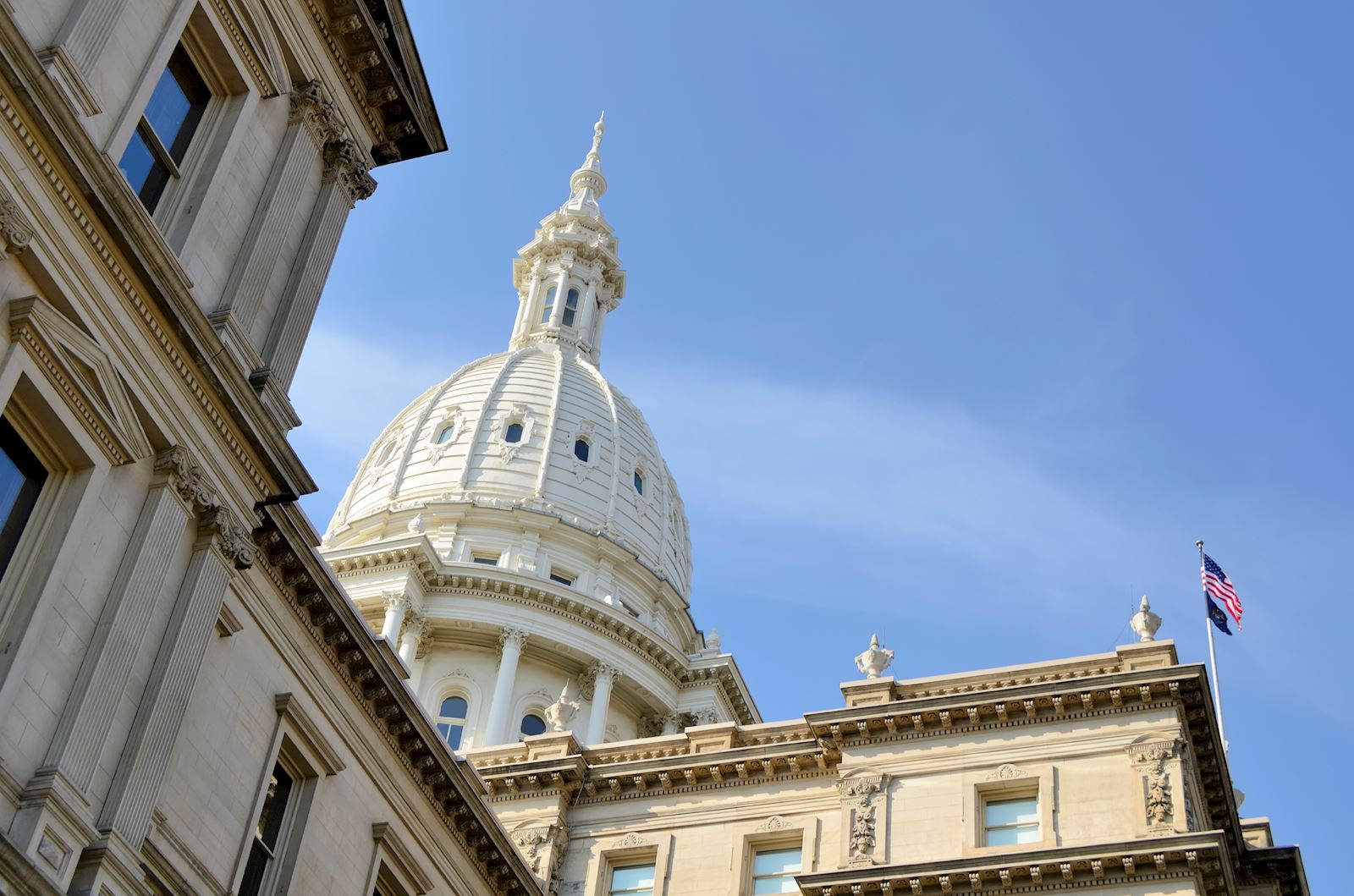Lansing Update: MCC Fights Against Predatory Lending and more…
Posted February 11, 2022
In this update:
- Here's What MCC is Watching in Governor's Proposed Budget
- MCC Joins Opposition Against Expanding Predatory Loan Practices
- Latest Spending Bill Includes More Money For School COVID Tests
- State House Agrees to Ban Research on Aborted Fetal Tissue
- Bills Cracking Down on Unnecessary Incarceration Head to Governor
Here's What MCC is Watching in Governor's Proposed Budget
This week, Gov. Gretchen Whitmer unveiled her proposed spending plan for the fiscal year that begins Oct. 1. This marks the first step in the state budget process. Lawmakers in the Legislature will take the next few months to review and propose their own plans, and a final spending document is required by law to be on the Governor's desk for consideration by July 1.

Below are just some of the proposed spending items of interest to Michigan Catholic Conference (MCC) that we will be monitoring:
Earned Income Tax Credit: As the Governor previously announced, she is seeking an increase to the earned income tax credit (EITC), which is estimated to lift more than 22,000 families out of poverty. The MCC has voiced support for an EITC increase, including the larger increase proposed by the Legislature in Senate Bill 417.
Nonpublic Schools: As it stands now, the Governor's budget leaves out support for nonpublic schools when it comes to certain funding proposals. Nonpublic schools were excluded from the following:
- A teacher retention bonus program to provide up to $11,000 to educators in public schools over the next four years.
- A robotics grant program, even though this is something the Governor has signed into law the past several years, with $600,000 in the current budget for nonpublic schools.
- A $51 million school safety program to protect schools and provide for law enforcement resource officers, even though in previous years, nonpublic schools have been included, with up to $2.5 million provided in the current budget.
- Reimbursements for costs incurred complying with state health, safety and welfare mandates.
The Michigan Association of Nonpublic Schools (MANS) called the exclusion of thousands of Michigan educators who teach 100,000-plus Michigan students in nonpublic schools "disrespectful and short-sighted."
"Nonpublic school teachers are required to have the same credentials to teach as those in public schools. In fact, these teachers have met the Governor's stated goal of providing in person learning throughout the COVID 19 pandemic. There is no reason why they should not be included in this effort to retain and attract teachers for all of Michigan's K-12 schools," said Brian Broderick, executive director of MANS.
However, there was a $3 million appropriation proposed for dual enrollment of nonpublic high school students for college courses, the same amount as the current year, and there were no changes made to shared time.

Tuition Help For Low Income Students: The budget proposes increasing Michigan Tuition Grants from $2,800 to $2,900 per student, while maintaining the funding level of $42 million from the current year appropriation. This program assists low-income students with attending private colleges and universities in Michigan.
Women & Children: The budget does not include funding for pregnancy and parenting support programs that provide alternatives to abortion. The budget would also retain the $55.20 administrative rate for foster care providers.
Fighting Human Trafficking: The proposed plan allocates $200,000 for human trafficking intervention services and includes language calling for the state to collaborate with schools on training for students regarding human trafficking and sexual abuse prevention.
The budget language would allow individuals who are victims of domestic violence or human trafficking to receive an additional 3 months on food assistance. There's also a provision for a $50,000 clothing closet for child trafficking survivors.
Serving The Poor: The budget would retain $7.23 million for the annual clothing allowance and also sets aside $250,000 for diaper assistance grants.
Affordable Housing: The Governor's budget includes several proposals that could improve access to housing, including:
- $200 million for the Michigan Regional Empowerment Program, a competitive grant program that could be used to support affordable housing.
- $40 million for Home Repair and Plumbing Assistance to provide grants to households earning up to 200% of the federal poverty level to make minor home repairs (windows, doors, and safety fixtures) as well as critical plumbing repairs to ensure safe, running water.
- $11 million for the Attainable Housing and Apprenticeship Program, to address the need for attainable housing while expanding access to paid apprenticeship training opportunities.
- $10 million for grant assistance to rural communities faced with challenges like affordable housing.
MCC Joins Opposition Against Expanding Predatory Loan Practices
A House committee this week did not advance a bill to expand predatory payday lending practices in Michigan after MCC and other organizations testified against it.
Tom Hickson, vice president for public policy and advocacy for MCC, said House Bill 4004 would only worsen the financial hardships low-income people find themselves in when they take out these supposed short-term loans, only to have to pay back much more than what was borrowed at triple digit rates. This has resulted in already financially strapped people getting caught in a seemingly endless cycle of debt.
"Who would seriously advise your loved ones, or really anyone to utilize this service, especially knowing they are already in a financial hardship?" Hickson said, who provided a few examples of lower interest, small dollar loans that are better alternatives than expanding the payday lending industry.

Hickson shared a story about someone who ended up taking three years to pay back a $600 loan from a payday lender, with his credit score taking a hit as a result.
Between Feb. 4 and Feb. 8, grassroots members of the Catholic Advocacy Network responded to the call to contact House members to oppose the bill and sent more than 200 email messages to lawmakers. Thank you to all who used their voice to speak out against this bill and to show support for the poor and vulnerable in our society.
MCC will continue to monitor developments on this bill.
Latest Spending Bill Includes More Money For School COVID Tests
All schools - including Catholic schools - would have access to COVID tests in another round of funding OKed by the state Senate this week.
The $1.2 billion total contained in House Bill 5523, sponsored by Rep. Julie Calley (R-Portland) includes within it $14.9 million for COVID tests for schools.
The supplemental spending bill will head next to Gov. Gretchen Whitmer for her consideration to sign. Supplemental spending bills appropriate money for spending in this current fiscal year, compared to the budget-setting process described above, which is for proposed spending for next year beginning Oct. 1.
State House Agrees to Ban Research on Aborted Fetal Tissue
The state House passed legislation banning the use of tissue taken from aborted babies for scientific research, a bill MCC has previously backed.
House Bill 5558, sponsored by Rep. Thomas Albert (R-Lowell), makes it a five-year felony to conduct research knowingly on an organ, tissue, or cell taken from a dead embryo, fetus, or neonate obtained from an abortion. House Bill 5559, sponsored by Rep. Bronna Kahle (R-Adrian), would change sentencing guidelines to reflect the five-year felony described in the other bill.
MCC has previously said fetal organs obtained from elective abortions must never be seen as a standard tool of medical research, as it inevitably creates a demand for abortion and suggests abortion is a necessity to procure human material for research.
Both bills passed the full House and now move to the state Senate for consideration.
Bills Cracking Down on Unnecessary Incarceration Head To Governor
The state Senate unanimously approved a series of bills with MCC support that are aimed at reducing unnecessary incarceration.
House Bills 4149, 4151 and 4152 would reclassify several fishing and hunting misdemeanors as civil infractions, so individuals who commit the violations would receive civil fines rather than jail time.
MCC supported these measures to ensure Michiganders are not forever criminalized and to offer judges more discretion to determine the appropriate response to a crime.
The legislation is sponsored by Reps. John Damoose (R-Harbor Springs), Steven Johnson (R-Wayland), and Gary Howell (R-North Branch).
The bills now head to the Governor for her consideration to sign into law.
